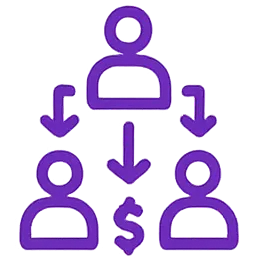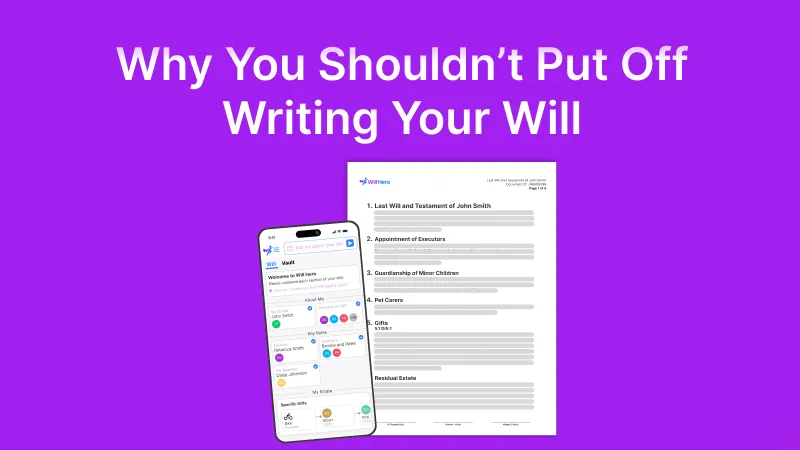Will and testament cost: A Comprehensive Guide
What should a Will and testament cost? A simple question with many factors. This guide ensures estate planning is comprehensive and budget-friendly.

An overview to Will and testament cost
Understanding will and testament cost is essential when planning your estate. Creating a Will and testament is a crucial step in estate planning. It ensures your assets are distributed according to your wishes. But how much does a Will and testament cost? How much is too much? What do and don’t you need? And is it a trade-off between easy and comprehensive? It’s hard to know, because it’s a purchase most of us know very little about. Let’s face it: Buying a Will is a little like purchasing laxatives – it’s uncomfortable, an experience you hopefully revisit infrequently, and people rarely swap tips about where to get the best deal during dinner party conversation.
The cost can vary widely. Factors like complexity and method of creation play a role.
Type of Wills fall into these broad categories (we’ll revisit this in more detail later):
- DIY options are affordable, but can be daunting because they lack the guidance needed to give you confidence and peace-of-mind
- Online services offer convenience, and are similarly affordable, but can lack the flexibility to suit your personal circumstances
- Hiring an attorney offers robustness and the ability to manage more complex estates, but that legal guidance comes at a much higher cost
Understanding these costs, and the pros and cons of alternative methods of Will creation, help you make an informed decision. So let’s explore these factors.

What is a Will and testament?
A Will and testament is a legal document. It outlines how you want your assets and responsibilities distributed after death. Whilst straightforward Wills don’t have to be particularly daunting, most people’s unfamiliarity with the process means that some guidance is required – even if the sum total of your assets comprise your cat, Boris, and a second-hand drum kit you bought 20 years ago. We’ll get into how complexities and nuances, such as your instructions for Boris’ future care, may or may not affect Will and testament cost shortly.
At a high level, creating a Will helps avoid intestate succession laws. Without a Will, asset distribution falls back on a government-derived framework (this is called dying intestate). These laws vary by state and create a potentially messy set of circumstances. Not only do proceedings not adhere to your wishes without a legally recognised Will, an administrator has to be appointed via legal process, intestacy laws have to be navigated, and proceedings are often hotly contested by affected parties.
While common circumstances – such as complex assets and blended families – make any Will more elaborate, key aspects typically include:
- Introductory statement and identification of the testator (you, the person making the Will)
- Revocation of previous Wills (a statement revoking instructions contained within previous Wills)
- Appointment of executor(s)
- Asset distribution instructions
- Guardians for dependents (those who cannot care for themselves; typically children of minor age) – learn more about choosing guardians for your children and pets
- Care for pets – like human dependents, this common section lays out instructions for caring for animals
- Funeral expenses and wishes
- Special provisions (such as trusts that instigate with specific terms following your death)
Wills are fundamental to estate planning. They provide peace-of-mind, knowing your wishes are documented. Anyone with assets or dependents should consider writing a Will.

Why estate planning matters
Estate planning documents are important to ensure your wishes are met after you pass away. Without proper planning, the future of your assets could be uncertain. It minimises family disputes and provides clear instructions.
Many people delay estate planning, which is understandable given that, traditionally, it’s a daunting process where Will and testament cost can stack-up fast or leave you feeling uncertain. However, it is crucial for financial security. It makes the process smoother for loved ones during tough times.
Key reasons to consider estate planning, from a Will-centric perspective:
- Protects your family’s future
- Preserves wealth across generations
- Outlines care instructions for minor children and pets
- Safeguards your personal legacy
Estate planning is not solely about money. Comprehensive planning safeguards your legacy and helps manage life’s uncertainties. Many people put off writing their Will, but taking action now ensures your family’s future security.

Factors that influence Will and testament cost
Will and testament cost can vary widely. Understanding the factors involved can help you plan better, and identify what you can and cannot do without.
Consider these factors:
- Estate complexity
- Number of beneficiaries and specificity of gifts
- Differences in state and territory requirements
- Maintenance and updates
- Method of preparation (DIY vs online services vs attorney)
Let’s explore these in a little more detail.
Complexity of your estate and the impact on Will and testament cost
Complex estates often require more resources to manage and disburse. More assets or varied investments require detailed planning and may increase Will and testament cost, depending on the type of Will solution or provider used. For simpler estates, costs are usually lower. However, each estate is unique, and many factors can affect the overall cost of your Will and testament.
Top factors to consider, common to most Wills, include:
- Number of beneficiaries
- Blended family situations – learn about spousal inheritance rights in Australia
- Types of assets – including superannuation and how it’s distributed
- Backup and contingency plans for beneficiaries
- Conditional gifts and special instructions
How Will and testament cost varies based on the number of beneficiaries
Whilst any Will can be contested, it’s important to understand the implications of adding complexity regarding estate distribution and management. If you have many people you want to leave things to, or detailed gifting instructions, this may mean two things:
- Most online Will solutions and DIY Will kits won’t stand-up because they lack the functionality to correctly incorporate complex beneficiary and gifting conditions
- If the number of beneficiaries and specific gifting instructions are nuanced, this significantly increases the likelihood of requiring attorneys to prepare your Will, as well as additional drafting time – both of which add notable cost
Will Hero shines here, providing the flexibility to create complex, and completely tailored, gifting instructions to almost any number of beneficiaries – without incurring additional costs. You can create up to 20 layers of backup beneficiaries, with each layer containing up to 20 branches, and up to 50 beneficiaries per branch. In short, you can have thousands of beneficiaries going potentially 400 levels deep for a single gift. Better yet, the Will Hero platform has been validated and verified by licensed solicitors too.
How differences in state and territory requirements affect Will and testament cost
There are some location-specific factors that may affect Will and testament cost in Australia. However, for most simple estates, the bulk of the Will and estate cost isn’t derived from state differences, but from the complexity (number of assets, trusts, foreign properties, business holdings, beneficiaries, etc.). For example, the ‘base cost’ of a self-created or professionally drafted Will won’t typically vary wildly from NSW to Victoria. But, when the estate is large or complex, or assets cross state lines, the jurisdictional rules begin to matter more. Location can also play a factor in fees incurred to administer or action a Will after the testator (the person to whom the Will belongs) passes away. This is known as probate: The legal process through which a court confirms the validity of a deceased person’s Will and gives the named executor the authority to administer the estate (gather / call in assets, pay debts, distribute to beneficiaries etc). Whilst not a factor in the cost of creating a Will, it’s a common query, which we address below.
With that context set, here are a few of the top location-based factors that can potentially affect will and testament cost:
- Regulatory and legislative differences: Legal requirements regarding Will witnessing, storage, and certified copies differ from place to place. Whilst relatively minor in most instances, these differences can affect the amount of time and resources required to complete and manage a Will. For a detailed overview on How to Make a Legally Valid Will in Australia, including specific requirements for each state and territory, follow the last link (or click here). You can also check out Will Hero’s jurisdictional guides for making wills in ACT, NSW, NT, QLD, SA, TAS, VIC, and WA. But, seeing you’re still reading, let’s explore remote witnessing as an example of the differences between jurisdictions in Australia: According to the Department of Justice and Community Safety and Department of Communities and Justice, remote witnessing and electronic signing of wills in Victoria are expressly permitted when the s 8A procedure is followed (e.g., audio-visual link, counterpart signing). In New South Wales remote witnessing by audio-visual link is permitted, but wet-ink signatures are still required—electronic signatures are not allowed for wills. ForQueensland the official JP/Cdec online witnessing service does not cover wills. Wills in QLD must still be executed with two witnesses in the physical presence of the testator, unless a court later dispenses with the formalities. Meanwhile for ACT, SA, WA, TAS, and NT there is no generatl, permanent scheme allowing wills to be witnessed by audio-visual link. Traditional in-person witnessing rules apply unless a court validates an informal will.
- Complexity of estate and number of assets across jurisdictions: Whilst differences in state or territory legal requirements themselves tend to make minimal difference to Will and testament cost, geographic implications can increase complexity and thereby associated expenses. For example, if someone holds property / assets in more than one state (or country) more legal work may be needed (such as additional clauses or even multiple state-specific copies of a testator’s Will). Also, estates with trusts, business interests, overseas assets or holdings in multiple states tend to require more specialised legal / financial advice, increasing cost too.
A note on probate requirements and fees: Whilst not a cost incurred as part of creating your Will, a ‘grant of probate’ is most often required to validate a deceased person’s Will. This process is subject to fees. Issued by a court (usually the Supreme Court within the state or territory in which the owner of a Will resides), the circumstances requiring, steps involved in, and costs of probate vary by jurisdiction. The Australian Tax Officer provides a summary of legislation regarding Wills and probates for each state / territory in Australia. Probate is often required when real estate or assets are held solely in the deceased’s name and when complex estates span multiple state jurisdictions. Probate might not be needed where a simplified process is possible – where assets are of modest value, assets are jointly owned, and assets are specifically designed with designated beneficiaries (eg life insurance). For a breakdown of probate exceptions by state and territory, please see the appendix we’ve added at the end of this guide.
Why and how ongoing maintenance and updates affect Will and testament cost
Wills require updates to reflect life changes. Whilst these may be relatively infrequent, selecting a Will service or solution that enables both efficient changes (without incurring undue costs), whilst providing robustness for peace-of-mind, is critical. Common situations that may trigger necessary updates to your Will include:
- Changes in relationship status:
- Marriage: Marriage: In every Australian state and territory, marriage generally revokes a prior will, unless an exception applies. Common exceptions are: (a) gifts to the new spouse and appointments of the spouse as executor remain valid, and (b) wills made in contemplation of marriage are not revoked. The exact rules vary slightly, but the overall effect is the same across jurisdictions.
- Divorce / Separation: After divorce, or separation of a de facto relationship, you’ll often want to remove your ex as executor or beneficiary. Some jurisdictions automatically cancel parts of the Will relating to the ex-spouse, but other parts may remain, causing risks if not updated.
- Birth, adoption, or change in family structure:
- Many of us add new beneficiaries to our Will following the birth of children or grandchildren
- Adopting minors or being nominated as a god parent may necessitate guardianship updates in your Will
- Adjustments are required to protect the validity of your Will if someone named dies, is no longer willing and able to play their designated role (beneficiary or executor), or your relationship changes
- Significant changes in financial / asset situation:
- Acquiring or selling major assets, like a new property, shares, or business interests
- Receiving an inheritance or substantial windfall
- Financial loss or reduction in assets, which may change how you want things allocated
- Legal or regulatory changes:
- Changes in law (inheritance, superannuation, taxes, estate law)
- Court rulings that impact interpretation of Wills or associated documents
- Relocation:
- Moving interstate (or overseas) can matter because laws differ by jurisdiction; a Will drafted under one state’s laws might not properly comply with another’s
Will and testament cost by method of creation
Alright, we’ve explored the roles that estate complexities play regarding Will and testament cost. With those common factors outlined, let’s assess how different market solutions impact cost too.
Will and testament cost, as well as common associated benefits and drawbacks, can be broken down into three broad service categories: DIY Will kits, attorney-drafted Wills, and online Will solutions. Let’s explore the advantages and disadvantages of each below:
DIY Will kits: Without doubt, this is an affordable and convenient option. But, with simplicity comes some sacrifices too.
- Cost: In Australia, kits typically range from $20 to $150, offering a financially accessible place to start for most people
- Pros: Alongside affordability is convenience, with kits containing paper-based templated steps for you to follow.
- Cons: But, like most bargain basement offers (from end-of-bin wine specials, to clothing factory outlets or budget car mechanics), DIY Will kits have some innate shortfalls to consider:
- A simple, ‘one size fits all’ approach: Inflexible standard templates mean that creating a water-tight Will, which cleanly accounts for your personal circumstances, nuanced wishes regarding disbursement of assets, or unexpected eventualities, may be difficult. Because information needs to be entered into static out-of-the-box fields, many physical at-home Will kits don’t enable you to stipulate alternative beneficiaries in the event that nominated parties don’t survive you. Similarly, DIY kits often handle complex personal circumstances poorly: From blended family situations, to overseas assets and trusts.
- No support, leading to increased potential to fail legal requirements: No guidance leaves users to navigate an unfamiliar legal framework on their own. This can lead to simple mistakes that result in a Will failing to meet legal benchmarks. These can be the simplest of things: From the wrong number of witnesses, to pages not signed, which cast doubt on the validity of the document.
- Open to legal challenge (testamentary capacity & undue influence issues): DIY kits that lack professional or systemised guidance are more open to challenge. Courts may look more closely at Wills made using kits (especially by older people) for signs of diminished capacity or undue influence. Even informal documents like iPhone notes may not be valid. If the DIY Will is invalid (e.g. not properly executed), your estate may be distributed under each state’s intestacy laws – not according to your wishes. That can mean people you intended to benefit may ultimately receive nothing.
- Disputes and legal costs for families: Ambiguities or missing provisions often lead to family disputes, delays in probate, and higher legal costs. What was saved up-front can be dwarfed by later costs.
- Can’t update them: Realise you’ve made a mistake? The nature of most DIY Will kits means you have to start again from scratch, costing you additional time, money and exposing you to further risk of non-compliance.
- No checks or guarantees: Unlike using an attorney, or even dynamic online solutions (some of which offer digital mechanisms to support Will review), DIY Will kits mean you’re on your own.
Hiring an attorney to compile your Will: At the other end of the spectrum, lawyer-drafted Wills offer enhanced robustness and customisability. However, the costs can quickly stack-up.
- Cost: Starting at $300, then quickly climbing to $3,000 and over $8,000 for more complex estates.
- Pros: Engaging professionals removes risk in exchange for bigger price tags. Notable benefits include:
- Tailored advice to address complexities: If you have intricate business interests, trusts, overseas assets, or special beneficiaries (e.g. dependents with special needs), engaging a lawyer may be necessary to structure your Will appropriately.
- Increased likelihood of compliance: A lawyer knows the statutory requirements in your state: witnessing, signing, revocation upon marriage, etc. Having your Will compiled by an attorney can help avoid invalid or ambiguous clauses, reducing the risk of non-compliance. As such, professionally-drafted Wills may reduce confusion amongst heirs and propensity for disputes.
- Liability and professional accountability: Should lawyers drafting a Will make errors, there may be remedies available to you; including better legal protection.
- Peace-of-mind and certainty: Knowing your Will is more likely to do what you want, and be valid, reduces stress on you and your family.
- Cons: However, for many of us, engaging attorneys either isn’t feasible, or may represent costly overkill. Potential pitfalls to consider include:
- Higher cost: Solicitor fees tend to be significantly more than DIY Will kits or online Will solutions.
- More time required, less convenient: Ironically, despite engaging a third-party, the process can actually take longer. Drafting, consultations and revisions most often require multiple meetings; often during working hours. Many meetings are also in-person, creating logistical challenges for busy working people. Ultimately, you’re working at the convenience of your lawyer, not yours.
- Possibility of over-engineering: Sometimes legal drafting introduces extra clauses or complexity that may be unnecessary for simple estates, increasing cost without proportional benefit (e.g. using trusts where simple gifts suffice). For organising simple estates, attorney-based Wills are far from ideal.
- Fees can escalate: If circumstances change (you marry, have children, divorce etc), updating or revising an attorney-drafted Will often costs more too. Additionally, changes require formal amendments (codicils or a new Will).
- Significant upfront effort required: Unlike online solutions, which you can start, pause, and return to when convenient, solicitors need relevant documents, beneficiaries, assets and contingencies to be decided, prepared and collated up front. No wonder why, according to the ABC, up to 70 percent of Australians don’t have a legally binding will!
- A note on professional legal fees generally: Legal fees are a significant part of estate planning costs. Costs vary based on the lawyer’s experience and location. Hourly rates can add up quickly, especially for complex situations. Some attorneys may offer flat fees for specific services. In this regard, considerations include the:
- Attorney’s experience and reputation
- Fee structure (hourly vs. flat)
- Complexity of legal advice needed
Creating an online Will (when not using Will Hero) Digital Will creation options offer flexibility, convenience and accessibility to consumers. As you’d expect, there are potential compromises to consider too.
- Cost: Like more traditional Will kits, online Wills are typically inexpensive too, ranging from $60 to $250
- Pros: Online Will platforms offer a good compromise between traditional Will kits and Wills drafted by solicitors, with the added benefit of digital features.
- Convenience and accessibility: Rather than requiring a trip to a solicitor’s office during business hours, or even carving out quiet time at home with a physical Will kit, online Wills can be completed iteratively at times and places suitable to you.
- Speed: You can complete a straightforward Will in under an hour via many online tools. This not only reduces the effort needed to get started – a common barrier for many – but also allows you to quickly organise your affairs when unexpected events arise.
- User friendly process: Whilst the amount of assistance varies, many online Will builders offer a guided experience – using step-by-step instructions – to demystify the process.
- Easy on your hip pocket: Priced similarly to old-school DIY Will kits, online Wills are also highly affordable, while offering additional convenience, customisation and guardrails. These factors both increase the likelihood of completing the document and tailoring it to best reflect your personal circumstances.
- Cons:
- Inability to handle complexities: Many online Wills lack sophistication, meaning it isn’t possible to accurately cater for complex gifting scenarios or circumstances (such as blended families). Unlike many online products, Will Hero offers unlimited gifts and beneficiaries and backups.
- Insufficient customisation: While offering a more tailored experience compared to most DIY Will kits, most online Wills are still heavily templatised, inhibiting your ability to have your wishes accurately reflected in the final document. While Will Hero offers a guided experience, it also makes it simple to modify components to reflect your personal circumstances.
- Lack of support and legal oversight: Many online Will services leave users to navigate the unfamiliar process of Will-making essentially unassisted. Similarly, all-too-often certain scenarios have not undergone sufficient testing and verification by certified estate planning professionals, leaving users exposed to potential legal challenges. By contrast, Will Hero’s platform has been verified by legal professionals, while offering support and review services.

Will and testament cost: Why Will Hero stacks-up for everyday heroes
Let’s be honest: organising your affairs is essential. It helps your loved ones manage a challenging time more easily. But, when it comes to estate planning, many of us put it off. And, to be fair, the resources required by solicitors, the confusion of DIY kits, and even the uncertainty with many online options makes Will preparation an unappealing task.
That’s why Will Hero exists: A customisable online Will creation platform, which bridges market gaps left by other products categories. Will Hero doesn’t compromise between Will and testament cost and comprehensive estate planning for everyday heroes – like you.
First off, it’s a flat fee of $99: There’s no hidden extras, add-ons or gotchas.
Here’s how Will Hero provides a unique combination of features and functions that removes the stress, guesswork and delivers peace-of-mind:
- Ultra-fast, risk-free: Create a Will in as little as 15-minutes. Quickly designate executors and guardians, and clearly outline your wishes for the distribution of your estate. And, if you don’t love it, Will Hero offers both a 30-day money back guarantee.
- Flexible to update: When life changes, or the dust settles after you’ve made your Will, Will Hero facilitates quick and easy edits. Make updates to your Will for 12-months at no additional cost.
- Intuitive visual creation: The highly visual, family-tree-like, Will builder means the entire process is guided and easy-to-follow.
- Backed by legal experts: The platform itself has been validated by legal experts to ensure any Will produced is robust.
- Customisable: Will Hero enables you to tailor your Will according to your needs, streamlining the experience, reducing potential for confusion, and increasing the likelihood of your wishes being adhered to after your death. The basics are easy to set-up and modify to suit your circumstances – from nominating executors and benefactors, to outlining guardianship and specific gifting instructions, or stipulating desired funeral arrangements. Additional common clauses are available and can be modified as required, including care for pets (like Boris!), conditional gifts, hold in trust, debt forgiveness, back-up executors, guardians and beneficiaries. And more. Will Hero offers the easiest way to create a Will online in Australia.
- Secure: Your sensitive information and personal data is protected with military-grade encryption. Plus, you can use Will Hero’s Digital Vault for secure document storage.
- Smart Will review with AI: It’s easy to make mistakes when compiling your Will; even when your estate planning needs are straightforward. Will Hero’s AI-powered review automatically checks your Will for common errors. Feel 100 percent confident before you finalise your Will.
- Added support: Once your Will is finalised and the checkout process is complete, the team at Will Hero reviews your Will. Any potential issues are flagged for your consideration. Once happy, you can download your Will and even request a physical copy, printed on premium archival paper, to be mailed to you for signing. Learn about the safest places to store your Will once it’s completed.
Granted, if you’re lucky enough to have a particularly large and complex estate to manage, consulting an attorney may be the most prudent route. If not, we’re confident that Will Hero can meet your needs.

Top 5 mistakes that may affect Will and testament cost
When creating your Will, your choices can significantly affect your estate after your passing. For instance, selecting an inappropriate executor, such as an elderly relative who may struggle to fulfil their responsibilities, can lead to complications. These oversights can have a direct financial cost to your estate in order to settle the disputes. There are emotional consequences too, as your beneficiaries might not receive what you intended. Whilst important to consider, that’s a topic for another day.
For a comprehensive guide to all common Will mistakes and how to avoid them, see our detailed article: Common Mistakes People Make When Making a Will (And How to Avoid Them).
When it comes to mistakes that actually affect the cost of creating your Will and testament, here are some of the most common missteps that sap your resources up-front (eg: additional lawyer fees, redrafts and of course more time):
-
Getting the basics wrong
Missing signatures, using the wrong number of witnesses, or having a beneficiary witness your will means it’s invalid and needs redoing. Like buying a remote and forgetting the batteries – it looks fine, but it doesn’t work. Back to the shop you go, wallet in hand. -
Being vague or unclear
Writing “divide fairly” or “my belongings” leaves too much room for interpretation, so a lawyer has to redraft with precise terms. Imagine handing over a recipe that says “add some stuff and cook until done.” The chef (lawyer, or you, if you’re DIY) has to rewrite it properly. -
Forgetting to plan for life changes
If your Will doesn’t account for marriage, divorce, kids, or new property, you’ll need to pay for updates sooner than necessary. Say you buy jeans right before a new diet – they won’t fit for long, and you’ll be back at the counter spending more. -
Over- or under-engineering your estate
Adding complex trusts for a simple estate, or ignoring complexities like blended families, means extra revisions, time and potentially lawyer fees. It’s a little like installing a home cinema in a studio apartment (overkill) or running a restaurant with a sandwich press (under-prepared). Either way, the solution isn’t fit for purpose. -
Not preparing key information in advance
Turning up to the lawyer’s office, or completing a DIY paper will kit, without a clear list of assets, beneficiaries, or executors usually means multiple consultations or versions. Like rocking up to the supermarket without a shopping list, you’ll wander the aisles, forget the essentials, and have to make extra trips. Each one costs you more time and money.
Whilst being prepared is always the best idea, the team at Will Hero knows that that’s not always possible. That’s why you can make as many revisions required to your Will as you need within the first 12-months of creating it – absolutely free.

Frequently Asked Questions about Will and testament cost

Keeping your Will and testament cost in-check
Creating a Will and testament is a crucial part of estate planning. It ensures your assets are distributed according to your wishes. However you go about it, this document is a relatively small investment for future peace-of-mind. With various options available, from DIY kits to attorney services, there’s a choice for every need and budget. Understanding potential costs and associated deliverables, then making informed decisions based on that knowledge, helps avoid unexpected fees later.
By preparing now, you’re securing a smoother future, protecting your legacy, reducing stress on loved ones, while ensuring your affairs Will align with your desires.

Where to next? Getting started with Will Hero
If you’ve made it this far, you’ve already done the hard work of thinking about why a Will matters, and what Will and testament costs should look like for your individual circumstances. Now the question is how to get one done – and Will Hero offers a compelling bridge between expensive lawyer-drafting and high-risk DIY kits. Build a state-specific, legally valid Will in as little as 10–15 minutes, guided by visuals, scenario testing, and AI assistance.
The entire package – making edits, downloading or receiving a printed version, and following step-by-step signing instructions – is bundled at a flat rate with a 30-day money back guarantee.
So what’s next? If you haven’t already, head over to the Will Hero homepage, enter your email and click “Start My Will” – you can begin without paying a cent. Work through the guided questionnaire, map out your assets and beneficiaries, test different “what if” scenarios, and trust that the system will prompt you where or when you need to think harder. With AI assistance to guide you, by the time you hit “Submit for Review,” you’ll already have taken one of the most important steps in protecting your legacy. And the barrier to starting is low – no appointments, no surprise fees, and a process built to make you feel confident you’ve done this right.
Appendix: State / Territory Probate & Small-Estate Rules
Related Articles
- How to Make a Will in Less Than 12 Minutes - Quick guide to creating your will online
- The Easiest Way to Get a Will Online in Australia - Why Will Hero makes will creation simple
- Does a Spouse Automatically Inherit Everything? - Understanding inheritance laws in Australia
- How to Make a Legally Valid Will in Australia - Legal requirements and best practices
- Care for Pets in Your Will - Protecting your furry family members
- Safest Way to Store Your Will - Keeping your will secure and accessible










